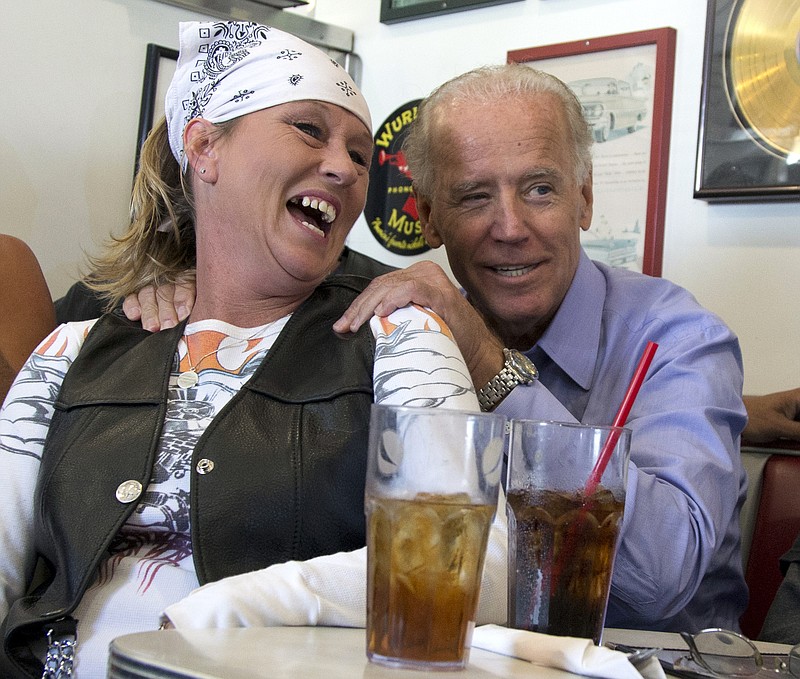As former Vice President Joe Biden continues his touching apology tour and apparently nears an announcement that he'll run for the Democratic nomination for president in 2020, we feel a measure of sympathy for the man.
For all of the reasons for which he can be criticized, and will if he becomes a candidate, being a warm and somewhat handsy man should be among the least of those.
Oh, we understand and sympathize that many women would never want to have the type of friendly, avuncular greetings Biden has too often bestowed, and that perhaps he should have relished those only on women with whom he already is a close friend, but he is not being accused of being Harvey Weinstein or even former U.S. Senate contemporary Al Franken.
As a candidate, the Delaware political lifer - though stained by serving with the left-drifting former President Barack Obama for eight years - could legitimately claim the Democratic middle. It's such a wide area now, between actual centrists and the rest of the Democratic field on the fringe left. And he once held some center-left positions, including voting for a constitutional amendment to overturn Roe v. Wade, voting for the Hyde Amendment that prohibited most federal funding for abortions and voting against partial birth abortions.
A successful Democratic candidate, after all, will need to pick off moderate voters who cast a ballot for President Donald Trump in 2016. It will be difficult for any of the fringe left candidates - the Bookers, the Warrens and the Harrises, for instance - to do so. They've already geared their candidacy to such radical positions on certain issues that they'll get few moderates. Biden, on the other hand, could.
But he does have a record. And one of the issues on which he has evolved is drug laws. In January, he called his previous support for stricter drug laws a "big mistake." At one time, he praised Bill Bennett, the first director of the U.S. Office of National Drug Control Policy under President George H.W. Bush, as having "performed with impressive intellect and success."
Bennett, in a recent interview with The Washington Examiner, said Biden wanted even more money than the drug czar back then for law enforcement measures such as police departments, criminal prosecutions and prisons.
"Czar," Bennett said the then-Delaware senator told him, "I want you to get after it."
In 1990, during a Senate Judiciary Committee hearing, Biden said, "I propose a significant increase in the drug enforcement side of this. The main reason I do that is I put a good deal more emphasis on the enforcement piece and a larger number on the drug trafficking areas."
Today, the push is to release nonviolent drug offenders and to send fewer to jail in the first place. We agree that sentencing schedules should be examined and that money for more and more prisons doesn't help keep people from being incarcerated in the first place. But Bennett and his ilk were doing something right in the 1979 to 1992 era, when there was a 59% drop in illegal drug use.
Illegal drug use in the U.S. peaked in 1979, when 14.1% of the population ages 12-up were users. In 2016, 10.6% of the population were users. But it fell to 5.8% in 1992.
One factor that contributed to the 1992 figure, according to an argument from the Institute for Behavior and Health, is the perception by youth that harm could come from drug use. It's popular now to say the war on drugs failed and to ridicule Nancy Reagan's "Just Say No" campaign in the 1980s, but research shows that - at least for marijuana - use among 12th graders fell to its lowest level around 1992, about a year after its perceived harm crested. As the perceived harm fell, its use rose again.
The perceived harm fell so much that a growing number of states have made marijuana use legal, but a growing body of research indicates the significant mental and physical damage its use can have. On this page Saturday, for example, it was noted by commentator John Stonestreet that the THC content of marijuana has risen from about 4% in 1995 to as high as 30% today, and that "people who smoked marijuana on a daily basis were three times more likely to be diagnosed with psychosis compared with people who never used the drug."
It also noted the monthly marijuana use among 18-to-25-year-olds in states where marijuana is legal is nearly three times the rate for those of the same age in states where it hasn't been legalized.
A gateway drug to psychosis? You decide.
The point is, Biden will have some explaining to do. When he focused on tougher drug policies nearly 30 years ago, the use of marijuana and other illicit drugs fell. Now, with drug use higher again, stricter drug laws were a "big mistake."
So while the undeclared candidate's hands-on-shoulders greetings have been all the rage, it's his position on issues critical to all Americans that will need to be carefully examined. Because if he expects to pick up any moderate support, it won't happen by bending further left.
